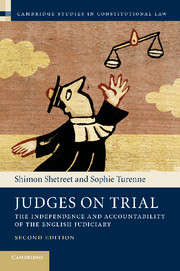Book contents
- Frontmatter
- Contents
- Foreword
- Acknowledgments
- Table of cases
- Table of legislation
- List of Abbreviations
- 1 Introduction
- 2 Constitutional steps towards judicial independence
- 3 The structure and governance of the English judiciary
- 4 Judicial appointments
- 5 Standards of conduct on the bench
- 6 Standards of conduct in extra-judicial activities
- 7 Immunity, discipline and removal of judges
- 8 Freedom of expression and public confidence in the judiciary
- 9 Conclusions
- Annex 1 Courts and tribunals structure
- Index
- References
1 - Introduction
Published online by Cambridge University Press: 05 June 2014
- Frontmatter
- Contents
- Foreword
- Acknowledgments
- Table of cases
- Table of legislation
- List of Abbreviations
- 1 Introduction
- 2 Constitutional steps towards judicial independence
- 3 The structure and governance of the English judiciary
- 4 Judicial appointments
- 5 Standards of conduct on the bench
- 6 Standards of conduct in extra-judicial activities
- 7 Immunity, discipline and removal of judges
- 8 Freedom of expression and public confidence in the judiciary
- 9 Conclusions
- Annex 1 Courts and tribunals structure
- Index
- References
Summary
1.1 Judicial independence is an essential pillar of liberty and the rule of law; ‘without a judiciary which can and will administer law fairly and fearlessly between the parties, no other guarantee given to the litigants by the law is likely to be of value’. The many requirements of judicial independence can be found in international and domestic foundational texts. Yet its modern meaning and practice is as unique as the character of each judiciary is, fashioned by checks and balances generated through history by various stakeholders in the judiciary. The protagonists in the story of judicial independence most noticeably comprise the executive and the legislature. In England and Wales, they also include a number of autonomous bodies with statutory powers, such as the Judicial Appointments Commission. Judicial independence depends thus to a significant extent on the constitutional relations external to the judiciary, such as the relationship between Parliament and the government. It is also a significant component of government culture to the extent that it must be supported by the political climate and social consensus. The political leadership and the legal elite must work together to develop a culture of judicial independence underlined by some significant guidelines. This process is of necessity gradual and ongoing.
The checks and balances regarding the judiciary create, however, a continuous tension between judicial independence and the public accountability of judges in a democracy. This tension, in turn, reflects a line of demarcation for the judicial power of the state, according to the principles of parliamentary sovereignty and separation of powers. This means that the model of judicial accountability adopted in a given society determines, to a large extent, the independence of the judiciary.
- Type
- Chapter
- Information
- Judges on TrialThe Independence and Accountability of the English Judiciary, pp. 1 - 20Publisher: Cambridge University PressPrint publication year: 2013



